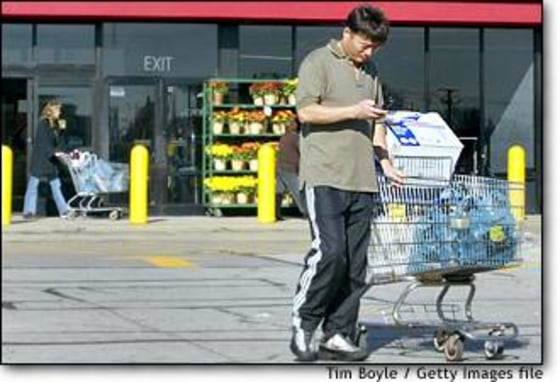With millions of advance tax refund checks scheduled to be sent out to U.S. taxpayers at the end of this month, big retailers like Wal-Mart are making plans to capture some of the extra funds. On Wall Street, investors are wondering if President Bush’s 2003 tax-cut bill will have a significant impact on bottom lines in the retail sector. The payout won’t necessarily cure the nation’s economic ills, analysts say, but might boost the fortunes of discount retailers.
Signed into law in late May, the president’s $350 billion tax-cut package is designed to drive economic growth and create jobs. The thinking is that the extra money in Americans’ pockets will give the struggling economy a much-needed shot of consumer spending, the main driver of U.S. economic growth, and boost companies’ top-line revenue growth.
The risk, of course, is that consumers may opt to save the extra money they receive, or use it to pay down debt, fearing the possibility of losing their jobs as the labor market remains stagnant. Last Friday, a government report showed the U.S. unemployment rate hit a nine-year high in June. And other recent data have shown only the faintest signs of economic improvement.
Overall, the tax cut is expected to deliver $30 billion worth of extra purchasing power to consumers in the July-to-September quarter according to Ed Yardeni, chief investment strategist at Prudential Equity Group. “That should make a big difference to income, consumption and GDP in the quarter,” Yardeni said. “But [the effect] could slow in the fourth quarter, depending on how consumers decide to spend [the extra income].”
Rapid results expected
American taxpayers should see a rapid return from the new tax plan.
Income tax rate cuts take effect immediately, and starting July 25 the government will begin issuing checks to the 25 million parents that qualify for an increase from $600 to $1,000 of the per-child tax credit — they will receive a check for up to $400 for each qualifying child. All told, the tax credit is expected to put some $14 billion into parents’ pockets.
Big retailers are hoping to grab a slice of the refund pie. Just as it did for the 2001 tax cut, Wal-Mart, the world’s largest retailer, will cash your child tax credit check in their stores. In 2001, Wal-Mart found that customers ended up spending about 25 percent of the cashed check in its stores and tended to buy big-ticket items, such as television sets.
Bill Dreher, a retail analyst with Deutsche Bank in New York, sees an instant benefit to discount retailers like Wal-Mart and Target from the new tax cut, albeit to a limited degree.
The current trend in the retail space is for consumers to focus on “needs” rather than “wants,” Dreher said. “People are buying more food and toiletries, which are lower-margin sales, instead of higher-margin products like apparel,” he noted. “So this tax break is going to help discount retailers with their top-line growth, but it will have a limited impact on their bottom lines.”
Dreher has a buy rating for both Wal-Mart and Target, but he recommends selling other retail firms — like Kohl’s — where he believes stock prices have moved ahead of the firm’s intrinsic value. “Retail stocks have had a great run up, but many firms don’t have the fundamentals to support that,” Dreher said. The Standard & Poor’s retail index has rallied 38 percent from a low for the year set on March 11.
Another hindrance for the retail sector is the fact that many firms are still working off an inventory surplus from a cold, wet spring season that dampened retail sales, especially at stores selling discretionary goods and apparel, Dreher said.
“This is especially true at Kohl’s, where there was a 27.6 percent increase in inventory in the first quarter and sales were 13.2 percent,” said Dreher. “The 14.4 percent spread is unusually high and reflects sluggish sales momentum.”
Group of upbeat factors
Yardeni at Prudential is more sanguine. He expects a confluence of upbeat factors to come into play in coming months — leading investors, traumatized by dwindling stock prices, Sept. 11 and the Iraq war — to spend money, some of which has been parked in savings accounts and money-market funds.
“The surprise could be that the consumer isn’t done yet and still has plenty of firepower to go out and spend,” Yardeni continued. “The obvious beneficiary will be the retailers.”
“A windfall tax cut should make consumers feel more confident,” said Yardeni. “The stock market is up and initial claims should improve. Profits should start looking better, and consumers’ confidence could improve. Put it all together and the consumer has a lot of money to spend.”
But if a recent poll by the Gallup Organization in conjunction with CNN and USA Today is to be believed, most consumers are unlikely to be in a free-spending mood this summer.
The Gallup data, gathered in late June, show only 22 percent of adults plan to spend any additional tax-related funds. The rest said they plan to save the money, invest it, pay off bills, or donate it to charity. The Gallup report matches an earlier study conducted by economists at the University of Michigan. They found that only about 25 percent of those surveyed spent the rebate they got under Bush’s 2001 tax cut.
“There’s no question that people are going to feel a little bit better off — their taxes are certainly going down either a little bit, or a lot,” Joel Slemrod, an economics professor at the University of Michigan’s business school, told CNBC. But the question of whether consumers feel wealthier, and so will spend more, remains uncertain, Slemrod said.
“I think we might be surprised by how low a fraction of this tax cut will be spent,” Slemrod added, but conceded “consumers don’t always do what they say.”
